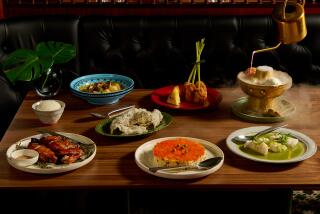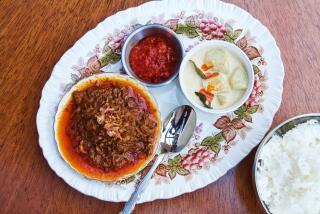Variety Adds Spice in Singapore Neighborhoods
- Share via
When Sir Stamford Raffles established Singapore in 1819 he set up separate residential areas for the various ethnic groups who came to work in the rapidly developing colony.
Today, Singapore’s population is a well-integrated mix of British, Chinese, Indian, Malay and Arab citizens, but the ethnic neighborhoods still stand as an integral part of the city’s political, cultural and commercial life.
Chinatown, Little India and Arab Street, in particular, feature stores in which souvenir hunters can acquire merchandise not sold in department stores or on main shopping strips.
Chinatown, bounded by Cross Street and Cantonment, New Bridge and South Bridge roads, is the largest of these ethnic neighborhoods, with vintage two-story buildings that contain shops on the ground level and residences above.
On Smith Street, Chua Guan Hong Kee (No. 2) sells inexpensive cloisonne bangles (from $1), silk pincushions surrounded by little dolls ($2), oversize paper fans with painted scenes of the Chinese countryside (from $5), glass-encased miniatures of country scenes made of bamboo (from $4), embroidered country scenes on small squares of silk (from $3), kites (from 50 cents), dragon clocks (from $4), rice baskets (from $5) and rickshaws.
Hoong Kong Electric & Trading (No. 4) sells ink boxes with stamp pads (from $4), sandalwood fans (from $2) and a wide variety of joss sticks with unusual fragrances (from 50 cents).
Gan Chye Hock (No. 10) has porcelain vases (from $5) and table bases (from $15) with traditional floral patterns.
Teck Soon Medical Hall (No. 22) specializes in various traditional Chinese medicines, herbs and spices, including a variety of ginseng. Chrysanthemum tea (50 cents a bag) is appealing.
Chuen Cheong Food Industries (No. 30) makes and sells Tiger Brand Soy Sauce as well as rice vinegar, Chilli Sauce, salted plums and canned soy beans. Each costs about 50 cents per mid-size container.
Fook Weng (No. 34) sells religious goods, including colorful large hand-painted paper items (dragons, automobiles, butterflies and other items) that are burned during Chinese religious ceremonies. They cost 50 cents and up, and can be used as decorative mobiles. In addition, there are candles (from 25 cents) and richly-scented joss sticks (from 20 cents per packet).
On Trengganu Street, Kuan & Meng (No. 13) sells decorative oversize fans (from $6) of gold paper or silk that are made north of Beijing. Seng Hup (No. 24) specializes in pottery, including hand-painted plates (from $2), ceramic baskets with metal fittings (from $8), tea sets with five cups (from $2.50) and decorative ceramic fish (from $4).
On South Bridge Road, Chop Kwong Soon (No. 254) sells jade charms (from $12), circle pins (from $8), Buddha sculptures (from $3), crosses (from $70) and bangles (from $90), as well as silk jackets (from $30).
Cheong Foo Kee (No. 256) has loose jade beads (from about $2.50 per packet). Koon Hin has kids’ tricycles (from $8) and two-wheelers (from $7). On Cheong (No. 261) sells 22-karat gold jewelry for the daily price per gram of gold, plus a nominal labor fee. Jade and gold bracelets cost about $125 and up.
Central Egg Supplier (46 Temple St.) has brown and gold-colored earthenware pots decorated with sculpted dragons and tree branches for 75 cents to $5.
-- -- --
Little India, the area around Serangoon Road, dates from 1825, when Indian workers came to Singapore to construct roads and bridges. The area has temples, restaurants and shops that sell everything Indian from saris to garlands of delicate fresh orchids, from curry powders to peacock feathers.
P. Govindasamy Pillai (48/50 Serangoon Road) is a huge general store. On the ground floor are foodstuffs, including coveted spices such as saffron (about 50 cents per gram) and turmeric (about 10 cents for 125 grams) and prepared curry powders (about 20 cents per 125 grams), as well as lentils and beans, flours, bread mixes and other items for Indian cuisine. Also, typical cooking utensils and pots and pans used in Indian cooking.
Upstairs, the shop features silks for saris. The staff is knowledgeable about the origins of the distinctive fabric designs, which range from cheerful plaids from Madras to printed silks from Kashmir to bright colors bordered with gold floral or geometric embroidered patterns from Varanasi. There are lightweight silks that drape beautifully and raw silks that wear well.
Sari-size lengths of fabric (usually about six feet by 44 inches wide) cost from about $20 to hundreds of dollars for finer silks with embroidered borders. The selection is varied, and the staff is patient in showing the fabrics and giving lessons in sari wearing. Naturally, the fabrics also can be used to make Western-style garments.
Several shops on Campbell Lane should not be missed. Durga Store (No. 2) sells sweet-scented garlands of sandalwood for 50 cents and up, as well as carved prayer beads (from $9), attractive cotton midriff blouses (from $8) to be worn with saris or shorts, hair clips festooned with silk flowers (from 75 cents) and peacock feathers (10 for $1.50).
Haniffa Textiles (No. 8) offers bolts or pieces of exotically-patterned polyester or silk for making saris or other garments. Prices 50 cents per meter.
Thandapani Co. (No. 16) is known for selling high-quality exotic spices and condiments such as rare chili peppers, coriander seed and tamarind paste. Vishnu Music Centre (143 Dunlop St.) offers all the latest hits from India, including Asha’s love songs in Hindi and S. P. Bala’s songs in Tamil. Cassettes cost 50 cents to $2.
-- -- --
Arab Street (and the surrounding area bounded by Beach and Ophir roads, Victoria Street and Jalan Sultan) is dominated by the Sultan Mosque. This Muslim district is inhabited mostly by Arabs, Malays and Buginese. Area shops specialize in baskets, batik and prayer rugs.
Highlights on Arab Street include Jothi Palayakat Co. (No. 42), with a vast selection of decorative baskets (from $2) with wildly patterned weaves, plus those shaped like parrots or other animals (from $4), and carryalls (from $2) of all sizes and shapes, wicker chairs, tables and lamp shades.
Eng Guan & Co. (No. 67) sells batik tablecloth and napkin sets for $5, plus sarongs for $1 or $2.
Uttamram & Co. (No. 69-73) displays rugs, mostly made of synthetics, for $7 and up.
O. Rahiman Sahib (No. 96) sells decorations for weddings and other ceremonies. One centerpiece has dozens of golden leaves ($7).
C. Rashiwala Bros. (No. 97) offers ornate fabrics bedecked with glitter, sequins or applique (from $9 per meter) for fancy stitchery, plus dress-up tiaras studded with brilliant and colored stones ($3 to $15).
Basharahil Bros. (No. 101) has a selection of batik paintings (from $2), top and skirt outfits (from $8), tablecloth and napkin sets (from $8) and pre-cut sarong lengths (about 2 1/2 yards) of fabric (from $3).
Prices quoted in this article reflect currency exchange rates at the time of writing .
More to Read
Eat your way across L.A.
Get our weekly Tasting Notes newsletter for reviews, news and more.
You may occasionally receive promotional content from the Los Angeles Times.










